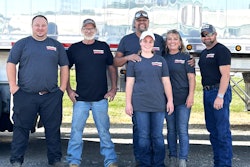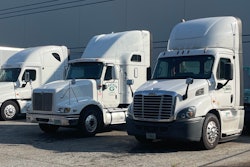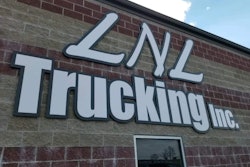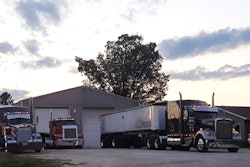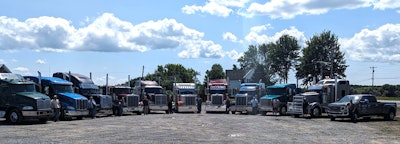
Maple Lane Transport owner Luke Martin is the eldest of three brothers who are partners in a series of businesses, anchored in the Martin family history by a portable shed construction and sales business. Martin, by 2010, had grown it to where it was humming. Yet "I was getting a little bored" nonetheless, he said. "The business was running on its own."
Vacant land around his home area in Philadelphia in north-central New York, near the Canadian border, provided an opportunity. "I grew up farming," Martin said -- mostly dairy. He bought some acreage and established Maple Lane Farms, planting and harvesting hay in big square bales and necessitating some way to transport the product from his area to buyers in "Pennsylvania, mostly, and some in the New England states," he said.
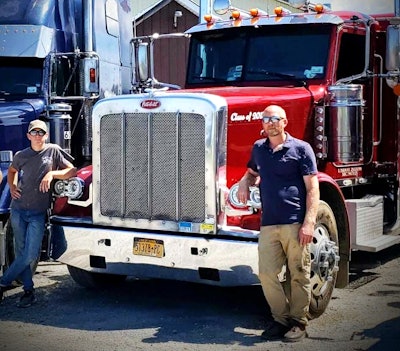 Maple Lane owner Luke Martin (right) with one of his sons and a company Peterbilt.
Maple Lane owner Luke Martin (right) with one of his sons and a company Peterbilt.

An early-days trucking-biz learning curve
Martin did it all in his first years trucking. "I was very involved in the trucking business, too much," he said. "It was rough getting started and with a lot of things to learn in trucking. I did all the dispatching for a couple years -- and ran the truck myself."
He still hauls when there's a need to transport hay and/or the harvest from various row crops, too, which Maple Lane Farms got into with further land purchases around 2010. Movement of their own product accounts for about 20 percent of the trucking business's work, Martin estimates, keeping some haulers busy starting in Fall and running into the Spring.
 This is one of 10 Small Fleet Champ semi-finalist profiles that have been airing throughout this month. (Access all of the published profiles via this link.) Two finalists in each category (3-10 trucks, 11-30 trucks) will be announced in October.
This is one of 10 Small Fleet Champ semi-finalist profiles that have been airing throughout this month. (Access all of the published profiles via this link.) Two finalists in each category (3-10 trucks, 11-30 trucks) will be announced in October.
Maintenance is handled in-house with two full-time mechanics in a purpose-built shop.
Dispatch manager Chelsie Reynolds, hired early in 2021, helps manage the interaction of the various aspects of the operation.
Other than employed drivers, "technically," she said, "I'm the only employee for Maple Lane Transport." The mechanics and an HR manager are employed by another business in the partnership, though they're integral to the trucking operation.
"Communication is a really big thing here," Reynolds said, and she's striven now over two years in the operation to find the "best way to communicate with everybody." She dispatches today through the MYSTC software package, a product developed by the National Association of Small Trucking Companies, where Maple Lane is a member. "I do everything from dispatching ... matching load reports to our mileage" to file IFTA reports quarterly and gathering information for other taxes for an in-house accountant.
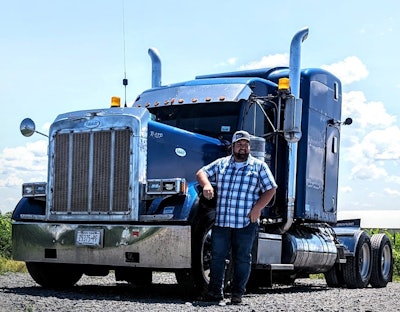 Mitchell Roose is in the process of purchasing the pictured rig from Maple Lane owner Luke Martin, along with a 48-foot flatbed he pulls.
Mitchell Roose is in the process of purchasing the pictured rig from Maple Lane owner Luke Martin, along with a 48-foot flatbed he pulls.
She manages roadside mechanical issues a driver may have by being their primary go-between with mechanics. "We’ve tried a few different systems" for accounting for necessary repairs in-house, she said, settling on a white-board in the shop where mechanics log a to-do list. When the work is done, they simply wipe the entry away.
"I’m it," she said about the fairly relaxed approach to back-office management. "It's just me and the drivers."
Reynolds previously worked as a house manager in a mentally handicapped facility, yet she's always been surrounded by trucking, she said. "I always loved the industry." Since she found work with Martin and Maple Lane, her husband, her father and her brother-in-law all have leased trucks there.
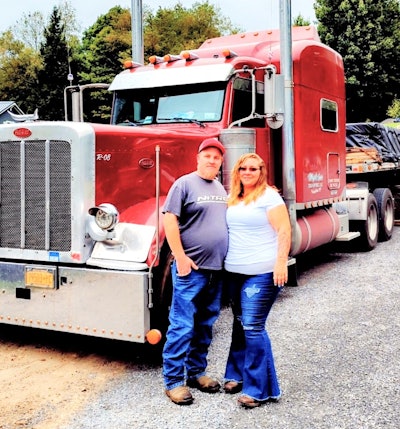 Chelsie's pictured here with her husband, Robert Reynolds, and his 2008 Peterbilt 389.
Chelsie's pictured here with her husband, Robert Reynolds, and his 2008 Peterbilt 389.
Growth aided by 'calm and cool' approach to management
Reynolds certainly has her hands full keeping 12 trucks loaded year-round these days, though she lauds Martin's "calm and cool and collected" management style. "It's a very family-oriented atmosphere here. We like to have fun, joke with each other. There's very minimal drama here -- we know when it’s time to stop joking and get to work."
Martin is "very generous," too, she added.
The company health plan is available for operators, likewise retirement accounts with the company matching up to 4%. "He puts $300-$350 a month to the health insurance," Reynold said, for employee operators. "If a driver needs help financially or can’t drive" for whatever reason, "he puts them to work" elsewhere in the related businesses.
She offered the example of an operator whose dedicated truck had broken down -- "and was going to be down for a while." Reynolds said. "He put him in the shop for a while -- we always try to find another revenue stream if something’s wrong."
Owner-operators leased there get use of the shop, too. "Luke doesn’t charge them to use the shop or use their tools," she said.
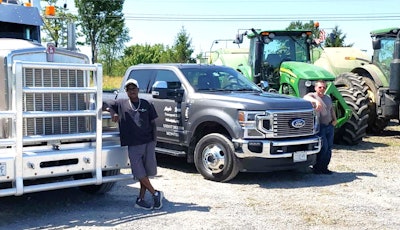 Owner-op Andrew Gockley (left) at Maple Lane's appreciation event earlier this year, leaning against his 2003 Kenworth W900L. On the right, his father, Galen Gockley, and the 2021 F350 Ford he owns, also leased to Maple Lane and hauling cars.
Owner-op Andrew Gockley (left) at Maple Lane's appreciation event earlier this year, leaning against his 2003 Kenworth W900L. On the right, his father, Galen Gockley, and the 2021 F350 Ford he owns, also leased to Maple Lane and hauling cars.
With recent growth in the truck count under the operation, Reynolds flags a similar doubling in revenue to more than $2 million in 2022, even as difficulties with rates have mounted. Her target for every truck in the fleet, regularly achieved, was between $8,000 and $12,000 in revenue weekly before late last year. Owner-operators and employed drivers are paid a percentage of the load. Owner-operators take home a large 87% , with another small amount that comes out for worker's comp and other insurances, Reynolds said.
All involved are "still making good money," she added, but the last year or so has certainly "made her job more interesting." In 2021 and much of 2022, she "wouldn't book a load less than $3.50 per mile," she said. She's had to give a little with the close brokers in her network, among them a regular customer for oversize-steel power-only routes South into New Jersey and elsewhere.
Still, though, she's drawing the line at $3/mile, and owner Martin is positioning the fleet for further growth and potential direct contracts with manufacturers nearby. "We don’t have quite enough trucks" to be able to promise the kind of capacity one in particular wants, she said. Speaking in August, though, she said the company was looking at a couple of trucks in Tennessee that might get them closer.
"We’ve thought about trying to expand the company and bring on guys from out of state," whether employed drivers or owner-operators, Reynolds said. "Our two-year plan is to try to get an office down in the Southern states, maybe somewhere down in Georgia" and continue to build solid North-South lanes.
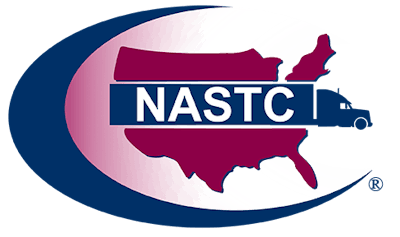 The National Association of Small Trucking Companies is sponsoring this year's Small Fleet Championship program. Finalists receive a year's worth of membership in the association, with access to a myriad of benefits from NASTC's well-known fuel program to drug and alcohol testing services and much more. All will be recognized at the association's annual conference, where the winner will be announced in November. Find more about the association via their website.
The National Association of Small Trucking Companies is sponsoring this year's Small Fleet Championship program. Finalists receive a year's worth of membership in the association, with access to a myriad of benefits from NASTC's well-known fuel program to drug and alcohol testing services and much more. All will be recognized at the association's annual conference, where the winner will be announced in November. Find more about the association via their website.
"When we hire new drivers," too, Reynolds said, they "take the driver safety course," a five-hour course that also "helps us on our insurance."
Fuel's certainly been a bear in the last year and a half for the company, as everywhere around trucking. NASTC's fuel card affords the company pump-price discounts, and owner-operators also net parts discounts through the company.
With a focus on cost, and a new goal to maintain revenues per truck at the rate of $6,500-$7,000 weekly, recognizing the challenges of the current rates environment, Reynolds estimates Maple Lane will maintain revenues for 2023. After a series of major truck restorations, she added, the company operators are "all running and have been constantly running," she said. "Those restorations are done, and we're full amp right now."
[Related: Wallace & Sons Transport: Specialized bulk loads, confidence and competence]

